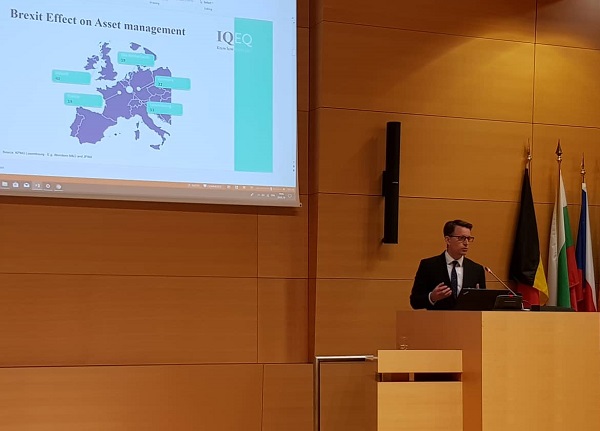 Justin Partington;
Credit: Jazmin Campbell
Justin Partington;
Credit: Jazmin Campbell
On Monday evening, the Indian Business Chamber of Luxembourg (IBCL) held a seminar on "The Brexit Effect: Luxembourg as a platform for Global Business" at the Luxembourg Chamber of Commerce.
Speaking on this occasion were Jeannot Erpelding, Director of International Affairs at the Luxembourg Chamber of Commerce, as well as three experts from the financial sector: Justin Partington, Group Head of IQ-EQ Funds and Brexit Effect; Marc Faltheim, Senior Executive at Lan -Bridge Group; Carlo Oly, Head of Relationship Management at Bourse de Luxembourg.
The seminar began with a welcome address by Jeannot Erpelding, who began by highlighting that despite some limited opportunities brought to Luxembourg by Brexit, both the Grand Duchy and the Chamber of Commerce strongly regret the UK's decision to leave the EU. In this regard, he emphasised the strong links that have existed between the countries for many decades, with collaboration extending to the financial sphere. Regarding the relocation of companies and financial stakeholders, Jeannot Erpelding stated that, on the one hand, "Luxembourg seems well-positioned" to welcome this transition. On the other hand, he argued that the economic health of the UK, as an economic partner, will also impact the health of the Luxembourg economy. Mr Erpeling added that, in light of global nationalism and protectionism (not limited to the UK), there is the need for a “more balanced, more inclusive trade policy”. He highlighted that Luxembourg, as a small country with a small domestic economy, has long understood "the importance of building bridges between markets [...] out of conviction but also out of necessity”. Mr Erpelding concluded by referring to Luxembourg as a long-term pioneer that "benefits from a multilingual and highly skilled workforce", a characteristic that sets the country up as a platform for global business, "independent of Brexit".
The first guest speaker of the event, Justin Partington, then discussed Brexit and its impact on asset management. He highlighted how Luxembourg and Ireland have been the main beneficiaries of company relocations from the UK following its decision to leave the EU. Building on an IQ-EQ Funds' survey from 2018, Mr Partington showed that whilst many UK asset managers were more optimistic than expected, there has also been a significant shift towards investment strategies in continental Europe. Regarding relocation, the survey revealed that 28% of clients at least considered relocating their fund as a direct impact of Brexit, most of whom cited Luxembourg as their main destination choice.
Turning to Private Equity, the survey showed that investments were lower than usual in UK, as a direct impact of Brexit. The IQ-EQ Funds' theory for this development is that UK managers are now focusing their efforts on continental European investment strategy. Justin Partington concluded that the uncertainty of Brexit was "hurting asset management", especially Private Equity in the UK, and thus there is a need to remove uncertainty and establish political stability.
The second speaker of the evening, Marc Faltheim focussed on Brexit but also the markets of India and China. Like Justin Partington, Mr Faltheim first highlighted the impact of relocations from the UK due to Brexit, highlighting the job losses such developments entail. and emphasising the impact that a Hard Brexit would have on both the British economy and Luxembourg and other European economies.
Building on his own experiences, Marc Faltheim then discussed the differences between the markets, demographics, cultures and history of China and India. Notably, he highlighted China's aging population and both the opportunities and challenges associated with investing in Indian markets: Mr Faltheim emphasised that it is not just one country with one market, but rather a federation of 29 states with separate governments and business environments and associated incentives. As such, each state should be "analysed on a case-by-case basis".
Finally, Carlo Oly discussed the Luxembourg Stock Exchange (LuxSE) opportunities and its Masala bonds and Green bonds. Speaking of the advantages of the LuxSE over larger stock exchange, and reflecting on Brexit, Mr Oly offered a comparison with the London Stock Exchange. He notably highlighted that Luxembourg holds only 27 listed domestic shares (compared to 1,630 in London) and most (80%) of its revenue is generated by listing, compared to larger stock exchanges which rely on trading and transactions. Concerning the main strength of he LuxSE, the speaker highlighted listed debt securities (23,458 compared to 14,000 in London). He added that the small size and political neutrality of Luxembourg has proven attractive to supranational issuers (15 currently).
Mr Oly went on to summarise the function of Masala bonds (95 bonds) and Green bonds. Regarding a Masala bond, a conventional bond denominated in Indian Rupee, issued by non-Indian company and listed on the international stock exchange, he highlighted the position of Luxembourg as the leader for exchanges (33) in this regard, before adding that the 21 INR bonds listed outside India and issued by Indian companies have a preference for London, namely for political reasons, and indeed, Singapore, over Luxembourg. Nevertheless, he concluded that there could be opportunities for Luxembourg associated with these markets in light of Brexit. Mr Oly finally discussed sustainable finance and the Luxembourg Green Exchange, highlighting the increasing importance of environmental risks in recent years. He concluded by discussing the role of Luxembourg's Green bonds, the first of their kind worldwide, in this context, as well as the interest expressed by China in these bonds and the importance of taxonomy (to avoid "green washing").
The event concluded with a Q&A with the audience and a networking cocktail.








